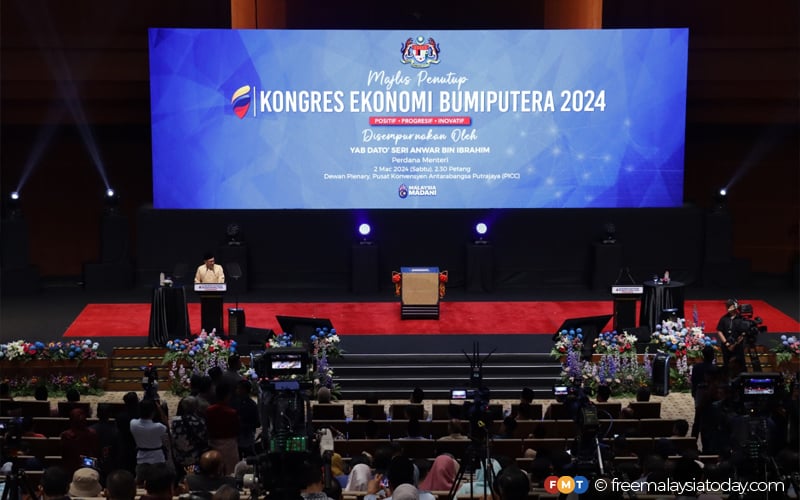
Ibrahim M Ahmad
As expected, the much-touted Bumiputera Economic Congress came and went with a whimper last week – a damning testimony to the inability of our current national leaders to plot Malaysia’s way out of prolonged mediocrity.
That outcome was clearly something the business community and the nation expected, given the many vacant seats in the hall, the lack of innovative new ideas among the speakers, and the lethargy of those in attendance.
Umno secretary-general Asyraf Wajdi Dusuki expertly excused the poor participation by absurdly describing the attendance as “organic”.
That term “organic” is normally used in a business sense to describe a healthy internally driven growth.
Yet, the nation’s recent growth cannot be said to have been healthy, even at an organic level. In 2023, the country fell short of achieving its modest bottom-line growth target of 4% of its gross domestic product (GDP).
At 3.7%, Malaysia’s economy performed worse than in the non-pandemic years of 2019 (4.41%), 2018 (4.48%), 2017 (5.81%), 2016 (4.45%) and 2015 (5.09%).
More alarmingly, the ringgit has declined by almost 14% since end-2021, falling from RM4.167 to the US dollar to reach its lowest level in 25 years, and is presently hovering near the RM4.75 mark.
The government and its apologists have been quick to excuse the decline in value as being driven by external factors, but that is likely only half, or at best 60% of, the story.
The reality is that Malaysia’s was the worst performing currency in Asean last year.
In simple terms, the poor handling of the economy – controlled exclusively in recent years by a succession of Malay leaders across all political parties – has contributed significantly to its present low value.
Despite this, no one in government has ever stood up to acknowledge any part of the blame, let alone propose measures capable of reversing the trajectories of our beleaguered economy and currency.
It is clear as daylight to just about every Malaysian that the economy needs transformation, yet no new ideas were put forward at the congress to drive the country’s GDP towards higher growth.
Instead, all we heard were protectionist strategies aimed at preserving Malay dominance in the country.
The deputy prime minister called for the setting up of a Bumiputera land corporation to increase the community’s land ownership. How that will improve the economic status of the average Malay is unclear.
Meanwhile, the head of the stock exchange proposed equitable opportunities and diversity disclosures to ensure members of the majority race are given business opportunities and retain their jobs.
Strangely, the damning statistic he revealed, that only one out of 97 listed companies in the last three years is Bumiputera-owned, did nothing to raise alarm bells about the lack of innovation and economic risk-taking among the Malays.
Then, a leading entrepreneur called for the government to ensure that 70% of all items purchased for its aid programmes are Bumiputera-owned halal products. That in itself suggests that Malay-owned businesses will continue to rely heavily on government contracts to earn their keep.
Ironically, he also said presently only 38.7% of halal certified businesses are Bumiputera-owned. On top of that, many small Bumiputera enterprises do not even meet halal certification requirements. Those statistics would narrow the field of suppliers quite considerably.
Meanwhile, the prime minister has committed more funds for Bumiputera enterprises without appearing to announce a clear national vision for their use.
Meanwhile, recent days have seen much discussion about how Singapore successfully used a whole-of-government approach to woo entertainment icon Taylor Swift into performing there exclusively.
The unique strategy – which I cannot resist calling “Kiasunomics” – included paying her not to entertain the idea of adding the neighbouring cities of Jakarta, Bangkok and Manila* to her Eras Tour. (*Let’s face it, there was little chance she was ever going to perform here.)
Clearly, that is the kind of creative, out-of-the-box thinking required in the 21st century to boost an economy. It is a skill that Malaysia, led by its present batch of Malay leaders, appears to sorely lack.
Sadly, the Bumiputera Economic Congress didn’t even acknowledge that shortcoming.
All said and done, our present batch of Malay leaders and their advisers are unlikely to ever master Kiasunomics.
Perhaps we should be looking for better ones. - FMT
Ibrahim M Ahmad is an FMT reader.
The views expressed are those of the writer and do not necessarily reflect those of MMKtT.



No comments:
Post a Comment
Note: Only a member of this blog may post a comment.